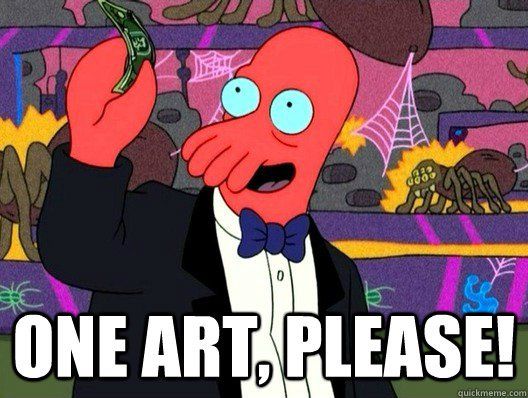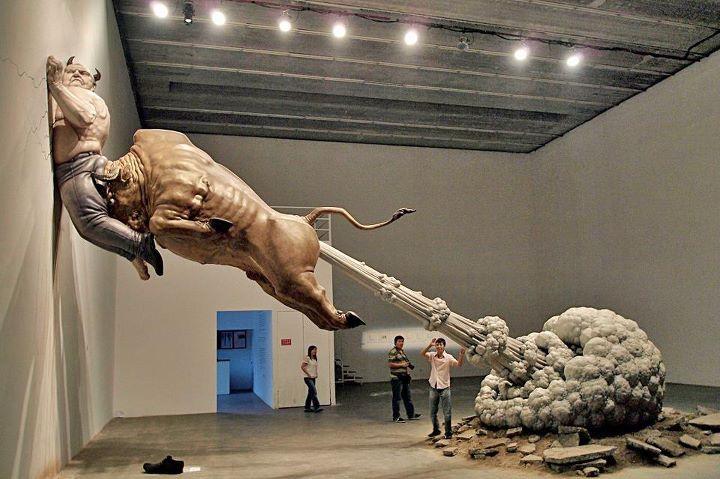The original topic and the derailment have quite a bit of overlap. I can take a swag at sorting the two into two camps, but it likely will leave both conversations disjointed.
Well, just the art derail then - already longer than the rest of the thread, and quite well defined, I think.
Can I just say I love the new title of the derail thread?
Beautiful

I guess I’ve never seen a bull fart before.
You learn something new every day.
No worries. I did see where you were coming from with that comment and I also agree that specifying that primary purpose is important to get as close as you can to a clear definition. It was the conclusion and framing of it that I was taking issue with, as you don’t find many people who take kindly to having their contribution being dismissed entirely.
A more constructive, co-operative approach would have not only gotten to a satisfying conclusion quicker, but avoided raising tensions
It’s easy to criticise and throw out other opinions that don’t exactly match our own, but a bit of give and take makes a huge difference.
I hope my comments throughout have come across as the constructive intent I’ve been meaning.
Exceptionally so, in this thread. The early ones sometimes sounded a bit dismissive, but it became clear that that was not your intent.
For the sake of clarity, we were looking at “feelings” from two different definitions. I from the position of affect, and I think you from the position of belief. I retract my statement about it being insultingly dismissive. I will still say that someone’s emotional reaction to something as art is not something that can be wrong. If I am struck by something as art, then for me, it is art. It doesn’t have to be art to anyone else for that to matter or be true to me, or anyone else.
Well, I’d be lying if I said that you didn’t have my back up, but that doesn’t exactly help anyone does it? 
For what it’s worth; in my work I write and audit work instructions, risk assessments, procedures etc and precision of language is important to me too.
I do also have to plough through legal regulations and codes of practice to ensure we comply to them as well - and if we applied that level of detail and definition to everything it would be an incredibly dull world to live on. 
And to geek out a bit, I’ve definitely created some Excel spreadsheets that were bloody works of art in every sense in my time haha
(maybe taking things a bit too far?)
I think you are not quite taking my attempted definition of art into account. I said, to start with, that there is an emotional/psychophysical response, which might perhaps be called aesthetic sensibility, and which produces the feeling that something is beautiful. Then there are human activities and artifacts that endeavor deliberately to produce that response, and indeed to heighten it. If doing so is the primary function of a cultural artifact, that is what I think defines art; if it has some other primary function, whether proving a mathematical result, or killing an enemy, or providing a certain kind of amusement (which I don’t feel able to define precisely at this point), then it’s a different thing—mathematics, or technology, or a game. It may still trigger aesthetic sensibility, at least in certain people. (I don’t rule out the possibility that some things may have more than one primary function.)
Whether something is meant to trigger aesthetic sensibility as its primary function seems to me to be an objective question. Whether it appeals to your personal sensibility is a personal reaction of yours. The emotional reaction to which you refer is what I am calling aesthetic sensibility, and it can inspire you to say that something is beautiful—but its beauty may not be what was intended in its creation; it may be a byproduct of some other intent, or it may occur without “intent,” in the song of a bird or the form of a snake or the colors of a sunset. Those things may be beautiful without being art.
At least as far back as the ancient Greek sophists, philosophy has attracted people who have an abnormally high level of pleasure in defining things in painstaking detail.
This being key. Not sure that would be a fun normal
Society relies on the variety of the people living in it to function. A little of everything’s good, too much of anything isn’t.
(bit of a gross oversimplification, I know, but I’m sure you get my point)
Art can be accidental, so intention isn’t relevant.
Your ability to convey precise language doesn’t impress me. Since we’re all about “impressing” here, (apparently that’s what it’s come to?), I also read philosophy for pleasure, and somehow manage not to rub it in people’s faces. Your writing simply doesn’t stack up to the standards you set for others. You denounce the stated definition out-of-hand, and then offer no alternative.
So yes, a definition of art should take conventional art into account. That’s just obvious. However, “a conceptual work that provides an emotional response” still includes all the things you listed, and excludes things like tools and mathematics, since these do not commonly evoke strong emotion. The definition already took into account what is considered art, and while it is not a perfect definition (nor was it intended to be) you fail to provide any alternative, and just criticize in order to preen your own feathers.
Ironically, I also don’t accept the more relativistic views of art, so as far as I can tell we probably agree, but because all your efforts so far have been criticism rather than discussion, you can’t accept it. So for all your pride in your own intelligence, you have yet to even make an argument.
P.S. I guess we squeezed one out of you…
But what I mean by art is things that are made by human beings with the primary purpose not merely of having aesthetic merit, but of producing awareness of aesthetic merit and of stimulating the emotional response of appreciation of aesthetic merit.
Honestly, I basically agree with this, just not the arrogant tone with which you belittle everyone around you.
The problem I have with “intent” is that there are plenty of artifacts for which we have no idea if it was intended to activate “aesthetic sensibility,” which I do not think is a requirement for art. One does not have to perceive something as beautiful for it to be art or create emotional resonance. The grotesque can do the same without being beautiful. Some of my favorite works of art are my favorite works specifically for the discomfort it forces me to reflect on and not a sense of aesthetic beauty.
I know painters who don’t feel animation is art, regardless of intent, and I know classical musicians who don’t view hip-hop as art because there is no theory behind it, also regardless of intent. Who is wrong in each of those cases? Our perception of art varies greatly based on our own identity and experience. Plenty of people think Picasso is garbage but marvel at mass-produced prints of football players. I don’t think you can tell any of those people that what they see as art is “wrong” because it doesn’t meet some standard determined by philosophical/semantic inquiry and elitism. It means something to them. It is art to them.
If I ask you what is six times nine, and you say “forty-two,” you are mistaken no matter how strongly you feel that that’s the right answer.
A good example that any argument depends on it’s terms of reference, because of course six times nine does equal forty-two, if of course your counting in Base13.
A good example that any argument depends on it’s terms of reference, because of course six times nine does equal forty-two, if of course your counting in Base13.
But of course I wasn’t doing so, because you and I both live in a culture that counts in base 10.

